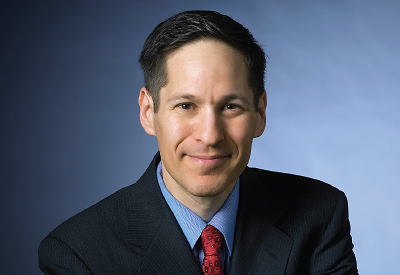CDC Director Frieden to Present Menninger Lecture at Convocation
Abstract
The CDC director spoke at a recent meeting of the AMA House of Delegates about the relationship between overprescription of opioids and the heroin overdose epidemic.
Rising suicide rates, opioid abuse, smoking cessation, and the nation’s heroin overdose epidemic are among the topics likely to be addressed by Thomas Frieden, M.D., M.P.H., director of the Centers for Disease Control and Prevention, at APA’s Convocation of Distinguished Fellows at this year’s Annual Meeting.

Thomas Frieden, M.D., M.P.H., says the nation’s death rates are rising for some age groups, and the key cause is opioid overdose.
Appointed director of the CDC in June 2009, Frieden has had an impressive career as a public health expert. Trained in internal medicine, infectious diseases, public health, and epidemiology, he has a special expertise in tuberculosis control.
From 1992 to 1996, as a CDC assignee, he led New York City’s program that rapidly controlled tuberculosis, including reducing cases of multidrug-resistant tuberculosis by 80 percent. While working in India for five years as a CDC assignee to the World Health Organization, he assisted with national tuberculosis control efforts.
The program in India has treated more than 10 million patients and has saved more than 3 million lives.
As commissioner of the New York City Health Department from 2002 to 2009, Frieden directed the city’s effort that reduced the number of smokers by 350,000 and cut teen smoking in half. Also, New York City became the first place in the United States to eliminate trans fats from restaurants, leading more than 50 national chains to eliminate trans fat from their menus, and to require certain restaurants to post calorie information prominently.
As CDC director, Frieden led the nation’s response to the 2009 H1N1 influenza virus pandemic. And he launched the first-ever national paid anti-tobacco media campaign, CDC’s Tips from Former Smokers, projected to help more than 100,000 smokers quit, saving money and preventing tens of thousands of deaths.
Frieden has also been vocal about the problem of opioid abuse and the related problem of heroin use and overdose. During a special educational session on the subject at the Interim Meeting of the AMA’s House of Delegates (chaired by psychiatrist and former APA Board member Patrice Harris, M.D., who is chair-elect of the AMA Board), Frieden emphasized the widening scope of the opioid-abuse epidemic and its overlap with heroin abuse and overdose and with other diseases.
“The death rates traditionally have been falling for all groups, but we are seeing rates for some age groups rising, and the key cause is opioid overdose,” Frieden said at the meeting. “We are also seeing a rise in suicides, some of which are related to addiction.
“For every one person who dies from an overdose, there are 12 who are admitted [to hospital emergency departments] for it,” Frieden continued. He noted that in a small rural county in Indiana—with a population of just 4,300 and a single case of HIV—drug use and needle sharing resulted in more than 180 cases of HIV in just over a few months. “That’s a horrific outbreak in a town of 4,300,” he said.
Frieden emphasized that the spike in heroin deaths is related in complex ways to the overprescription of opioid pain killers.
“Three of four people using heroin began with prescription opioids,” he said. “The latter is a gateway drug. As we have tightened up on prescribing, people who have become addicted have gone in search of heroin” (Psychiatric News, December 18, 2015). ■
Frieden will deliver the William C. Menninger Memorial Convocation Lecture at the Convocation of Distinguished Fellows at 5:30 p.m. on Monday, May 16, in Hall B2, Building B, Level 1, Georgia World Congress Center.



